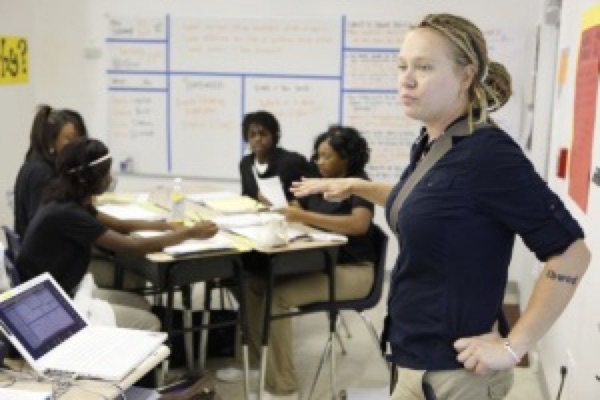Dispatch from the Education Front: An Interview with Kaycee Eckhardt
 Katrina’s Sandcastles packs a lot of book into 192 pages—it’s a personal memoir of learning to become a teacher, an—at times hopeful, at times critical—portrait of the charter school education system, and a recent history of New Orleans in the decade since the city was devastated by Hurricane Katrina and the botched governmental response, and a compelling look inside the lives and prospects of some of the most underpriveleged kids in the US. So when I finally met its author, Kaycee Eckhardt, it didn’t surprise me that she’s doing eight things at once—making tea, tending her dogs, talking about big ideas, and planning the details of her day—all at a mile a minute without even looking particularly frazzled. I sent her a few questions over email, and she miraculously found some time to answer them.
Katrina’s Sandcastles packs a lot of book into 192 pages—it’s a personal memoir of learning to become a teacher, an—at times hopeful, at times critical—portrait of the charter school education system, and a recent history of New Orleans in the decade since the city was devastated by Hurricane Katrina and the botched governmental response, and a compelling look inside the lives and prospects of some of the most underpriveleged kids in the US. So when I finally met its author, Kaycee Eckhardt, it didn’t surprise me that she’s doing eight things at once—making tea, tending her dogs, talking about big ideas, and planning the details of her day—all at a mile a minute without even looking particularly frazzled. I sent her a few questions over email, and she miraculously found some time to answer them.
1. The end of Katrina’s Sandcastles sees you leaving the New Orleans charter school of which you’d been a founding faculty member and planning to pursue non-classroom work. What have you been up to since then? Where are you right now?
I have a lot of gratitude for the work that I am able to do now. As a teacher, I had a great impact on the students in my room and school, and while I miss that work terribly, my current work allows me to share what I have learned and to work for education reform on a national scale. I run a summer institute for experienced teachers, where we learn about the real causes of the literacy gap and how to combat them with students in high needs schools. I also work directly with some K-2 teachers and classrooms on their early literacy instruction, and with some early career teachers in Nashville on curriculum preparation. All of my work is focused on high standards and high expectations for students, as well as pushing for equity in schools and districts. We are in the middle of a sea change in education right now, and it’s an exciting time to be doing good work for kids.
 2. The charter school that you describe in the book had a militaristic approach to discipline and structuring the students’ (and teachers’) activities. What are your thoughts about the benefits and drawbacks of that model?
2. The charter school that you describe in the book had a militaristic approach to discipline and structuring the students’ (and teachers’) activities. What are your thoughts about the benefits and drawbacks of that model?
We need to take a close look at what we are asking from students, and why. Students do need a high level of structure when they first enter a school – they need to understand the culture and what is expected. The purpose of initial compliance is to create an environment in which students can learn. However, often teachers and schools end up focusing on compliance instead of remembering that structure should be a means to an end = student’s learning. And often developmentally appropriate learning doesn’t look like students sitting quietly while the teacher presents, or until she involves them. It’s often messy and loud—it involves debate and discussion, group work and also a lot of time to think critique and contemplate. Teachers need to get out of the way and allow students to do the work—this means allowing some rule-breaking in place of academic experimentation. Ultimately, we need to ask ourselves constantly if the rules we impose on students—and teachers!—are a means to an end, or if they stifle the creativity and freedom of thought we want to foster in children.
3. A lot of the book is about your struggle to maintain your health and personal life in the midst of an all-consuming and high-stress job. That’s something a lot of readers in many fields can relate to—can you offer any life advice for your fellow committed-but-overwhelmed workers?
I don’t know if I have any advice, given that this is an ongoing struggle for me, as it is with many of us. But I do know that sometimes we forget that our relationships, families, and our bodies are jobs as well—they take effort, consideration, attention and a lot responsibility. Too often we allow our “work” to consume us and we allow that to be an excuse for investing less in what actually, in the long run, matters more. If I had any advice, it would be to ask yourself if you allow your “job” to give you a reason not to attend to other important things—yoga class, a bike ride with your partner, a dog walk, sitting down to dinner that you prepare, calling your grandmother, painting that wall in your house a joyful orange. Caring for yourself and what sustains you is your most important job.
 4. If you were to sit down with the president tomorrow, what three policy proposals for education would you recommend?
4. If you were to sit down with the president tomorrow, what three policy proposals for education would you recommend?
If I could wave a magic wand, and address three issues in education today, it would first be to put a great teacher in front of every child, regardless of that child’s neighborhood, city, socioeconomic status, race, or age. Great teaching is the number one indicator of academic success in students: a student with a great teacher can generate 5-6 months more learning in a single year than a poor performing teacher. But poor school leadership, low pay, and lack of support and training drive many of our best and developing teachers from the classroom. Retention of our best teachers need to be a major focus—and this includes the removal of teachers who are not up to par.
I would also ask for a significant focus on early education. A child’s reading level by third grade is one of the most consistent predictors of success or failure. A child who can’t read on grade level by 3rd grade is four times less likely to graduate by age 19 than a child who does read proficiently by that time. Add poverty to the mix, and a student is 13 times less likely to graduate on time than his or her proficient, wealthier peer. This should call our attention to what is happening before third grade—not after. A greater focus on knowledge-building, vocabulary, read alouds, and literacy in all content areas would shore up some of this—and there are some great programs, like Core Knowledge (which is free!) to do this.
Finally, I believe strongly that the adoption of the Common Core State Standards was the right move for our country. Contrary to the white noise of the media and a few loud, uneducated people, the standards do not mandate curriculum—they simply outline what student should know at the end of each grade. We are falling further and further behind other first world countries and this, in great part, has been due to the fact that we have been teaching to low standards, or erratic standards that changed from state to state. I encourage anyone who’s skeptical to go read them—they outline a clear, rigorous progression of what a student needs to do to be a competitive critical thinker by the end of high school. The shifts for Literacy and Math called for by the Common Core call for powerful changes in our classroom practice and changes that, if we stay the course, could increase equity in our schools, as well as drastically improve the quality of instruction.
This is part of a series of interviews with Microcosm authors. The most recent one was with another New Orleans writer, Urban Revolutions author Emilie Bahr.